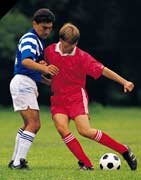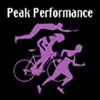Reprinted with permission from Peak Performance.
The link between soccer players and long-distance endurance athletes seems odd at first glance, since soccer is a game involving sudden sprints and bursts of energy rather than continuous moderate-intensity running, but the connection doesn't seem so extraordinary when one considers what happens during an actual soccer match.
In a typical contest, soccer players run for a total of 10-11 kilometers at fairly modest speed, sprint for about 800-1200 meters, accelerate 40-60 different times, and change direction every five seconds or so.
Although soccer players don't cover a full marathon distance (42 kilometers) during a game, the alternating fast and slow running which they utilize can easily deplete their leg-muscle glycogen stores. For example, just six seconds of all-out sprinting can trim muscle glycogen by 15 percent, and only 30 seconds of upscale running can reduce glycogen concentrations by 30 percent!
The high average intensity of soccer play (studies show that topnotch players spend more than two-thirds of a typical match at 85 percent of maximal heart rate) accelerates glycogen depletion. Plus, the time duration of a soccer match, 90 minutes, is more than enough to empty leg muscles of most of their glycogen.
In fact, research has shown that soccer players sometimes deplete 90 percent of their muscle glycogen during a match, more than enough to heighten fatigue and dramatically reduce running speeds.

They're Half-Starved!

 Unfortunately, many soccer players don't seem to be aware of the importance of dietary carbohydrate.
Unfortunately, many soccer players don't seem to be aware of the importance of dietary carbohydrate.
Studies show that large numbers of players eat only 1200 calories of carbohydrate per day, far below the optimal level of 2400-3000 carbohydrate calories. As a result, many players BEGIN their competitions with glycogen levels which are sub-par. Players who start a match with low glycogen usually have little carbohydrate left in their muscles by the time the second half starts.
That leads to bad performances during the second half. Glycogen-poor soccer players usually run more slowly - sometimes by as much as 50 percent - during the second halves of matches, compared to the first.
In addition, total distance covered during the second half is often reduced by 25 percent or more in players who have low glycogen, indicating that overall quality of play deteriorates as glycogen levels head south. Compared to competitors with normal glycogen, low-glycogen players spend more time walking and less time sprinting as play proceeds.
That's why taking in carbohydrate DURING competition can pay big dividends. In recent research carried out with an English soccer team, players consumed a glucose-containing sports drink during 10 of their matches but swallowed only an artificially flavored, colored-water placebo during 10 other competitions.
When the players used the glucose drink, the team allowed fewer goals and scored significantly more times, especially in the second half. When the placebo was ingested, players were less active and reduced their contacts with the ball by 20-50 percent during the final 30 minutes of their games. A separate study showed that swilling a glucose solution before games and at half-times led to a 30-percent increase in the amount of distance covered at high speed during the second half of a match.
However, just sipping a sports drink at random before matches and at half-time probably won't do much good, because soccer players must be sure they take in ENOUGH carbohydrate to really make a difference to their muscles.
An excellent strategy is to drink about 12-14 ounces of sports drink, which usually provides about 30 grams of carbohydrate, 10-15 minutes before a match begins.
The same amount should be consumed at half-time, although players may rebel at both intake patterns because of perceptions of stomach fullness. The important thing to remember is that through experience - trying out these drinking strategies on several different occasions during practices - the intake plans will gradually become comfortable and they will help reduce the risk of carbohydrate depletion.

Tapering Is Important, Too...

Soccer players should also eat a small meal containing at least 600 calories of carbohydrate about two hours before competition. 600 calories is the approximate amount of carbohydrate in three bananas and four slices of bread (eaten together).
Players should also try to 'taper' for a few days before matches, reducing their intensity and quantity of training in order to avoid carbohydrate depletion. During the taper and during all periods of heavy training, soccer players should attempt to ingest 9-10 grams of carbohydrate per kilogram of body weight (16-18 calories per pound of body weight) each day.
'Grazing' - eating 2-to-4 daily high-carbohydrate snacks in addition to three regular meals - can help players carry out this high-carbo plan successfully. However, carbohydrate is not the only nutritional concern for soccer players.
Fluid intake is also critically important. Various studies have shown that soccer players lose - through their sweat glands - from 2-to-5 liters of fluid per game.
 Even the lower figure could raise heart rate and body temperature during a match and might reduce running performance by about 4-5 percent for a typical player.
Even the lower figure could raise heart rate and body temperature during a match and might reduce running performance by about 4-5 percent for a typical player.
Fortunately, the sports-drink-intake plan described above - coupled with sips of sports drink during injury time-outs - can help to reduce the impact of dehydration. Although water and carbohydrate must be taken onboard, soccer players don't need to worry about replacing electrolytes during play.
Sweat is a dilute fluid with low concentrations of electrolytes, and most players can obtain enough electrolytes - including salt - from their normal diets.
However, the presence of salt in a sports drink can enhance the absorption of water and glucose. Most commercial drinks have about the right concentration of sodium; if you're making your own beverage, you should be sure to mix about one-third teaspoon of salt and 5-to-6 tablespoons of sugar with each quart of water that you use.
After all matches, players should attempt to ingest enough carbohydrate-containing sports drink to replace all the fluid they've lost during competition.
After strenuous workouts, water should also be replaced, and soccer athletes need to eat at least 500 calories of carbohydrate during the two hours following practice in order to maximize their rates of glycogen storage.
References:
- 'Carbohydrate, Fluid, and Electrolyte Requirements of the Soccer Player: A Review,' International Journal of Sport Nutrition, vol. 4, pp. 221-236,1994)
Owen Anderson
Click here to subscribe to the Peak Performance newsletter!
You can get a two-month trial for $9.99!
